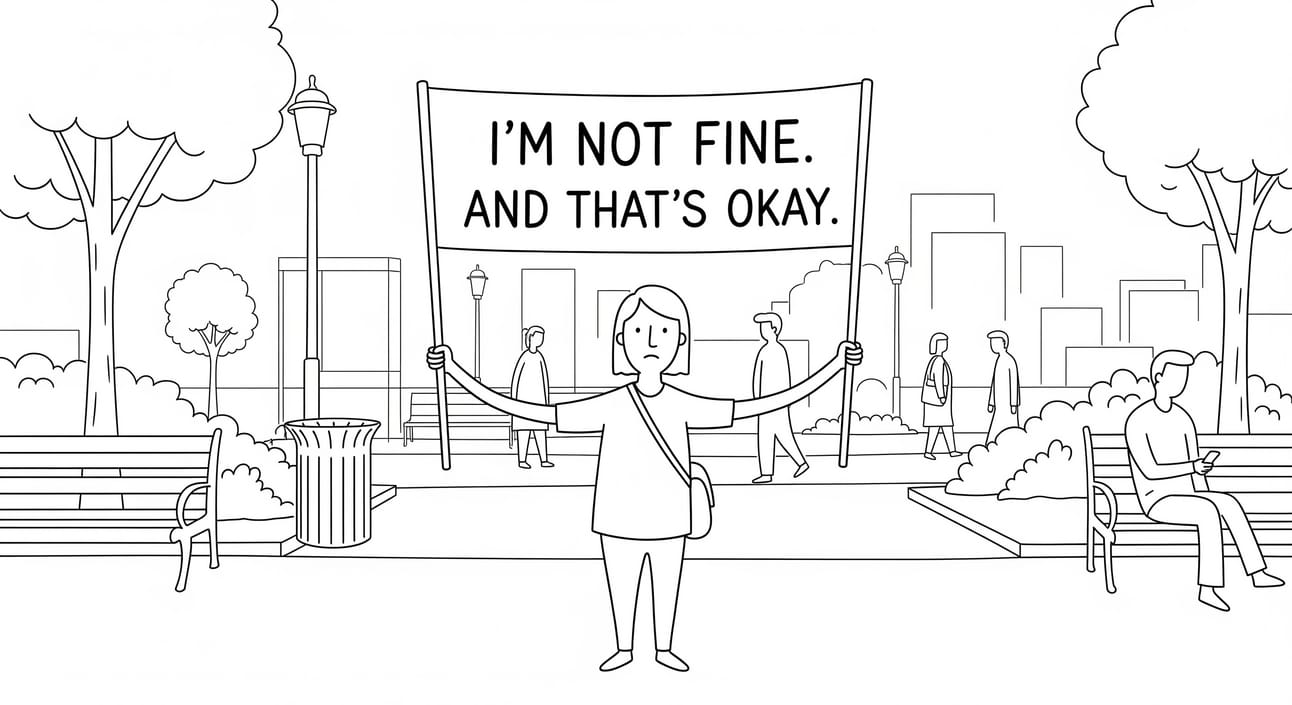Welcome to your Sunday Support.
I have lost track of how many times I’ve said “I’m fine!” this week.
I’ve said it while:
running on four hours of broken sleep,
juggling a teething baby on one hip while sending emails with the other hand,
panic-ordering groceries I forgot we needed,
PMS-ing like my hormones are staging a coup,
trying to figure out if I’m overwhelmed or just understimulated — or both.
Even when I showed up for my kid’s school field trip (because he really wanted me there), I felt that tightrope walk. I did the thing. I smiled. I made conversation with other parents. And then?
The overstimulation hit hard when we got home. My brain basically powered down and I spent the next few hours in a non-functional zombie haze.
This is the part people don’t see. And honestly, half the time I don’t have the energy to explain it.

The “I’m Fine” Lie is a Survival Reflex
For many of us — especially those of us with ADHD, anxiety, or any flavor of neurodivergence — small talk about how we’re doing feels like a trap.
We want to be honest.
We want to say:
“Actually, I’m holding it together with duct tape and caffeine.”
“Actually, today feels impossible.”
“Actually, I’m overstimulated and emotionally raw and trying very hard not to cry in the school parking lot.”
But saying that requires vulnerability. And vulnerability invites follow-up questions. Which means I either have to (1) perform emotional labor to explain myself, or (2) watch someone squirm because they weren’t actually prepared for the real answer.
So instead, we say “I’m fine.”
Because it’s easier.
Because it’s safer.
Because it’s exhausting to keep explaining a brain most people don’t understand.
The Need to Be Seen Without Performing
What I want — what many of us want — is to be seen without having to perform.
Not to dump everything out.
Not to spiral into a therapy session.
But for someone to simply get it. To understand that "fine" doesn’t mean fine.
That’s why communities like this matter. Spaces where we don’t have to justify our struggle or minimize it for the comfort of others. Where we can say:
“Today was a lot. I showed up, but it cost me.”
And everyone nods, because they know exactly what that means.
🫶Tips for Surviving Dysregulation
Name It - "I'm overstimulated" or "I'm maxed out." Naming it helps your brain stop spinning.
Lower the Bar - Identify 1–2 priorities. Let everything else wait.
Micro Anchors - Small predictable routines: your coffee, a playlist, standing outside for a minute. Familiarity calms.
90 Second Reset - Step away briefly. Bathroom break, stare at a wall, deep breath — remove input.
Default Scripts “I'm at capacity right now.”
Externalize It - Use notes, lists, or reminders to offload what your brain can’t hold right now.
Sensory Soothers - Noise-canceling headphones, sunglasses, fidget tools, or cold water — anything that helps calm your system.

If nobody’s told you this yet today:
You’re not fine.
And that’s okay.
You’re still showing up. You’re still trying. You’re still here.
That’s enough.
See you next week.
Talk soon,
Tara
CEO of Chaos & Co.